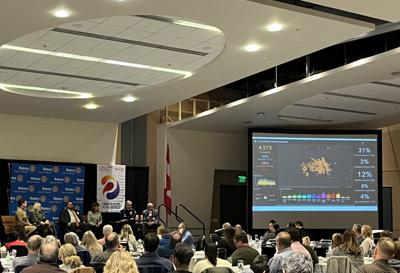Sir Patrick Stewart, known to many fans as Captain Jean-Luc Picard of "Star Trek: The Next Generation," was so terrorized by his father's repeated abuse of his mother that as a child, he wanted to kill him.
Tina Turner suffered years of intimate partner violence by her husband, Ike Turner. Oprah Winfrey has talked about the abuse she experienced and witnessed while living with her grandparents. And though he towered over his wife, Abraham Lincoln was battered by Mary Todd Lincoln, who threw items at him, hit him and chased him out of their house more than once.
Photos of Stewart, Tina Turner, Winfrey and Abraham Lincoln were shown before a panel discussion at the Yakima Downtown Rotary Club weekly meeting Thursday. The discussion centered on Yakima County's intimate partner violence crisis. Intimate partner violence and domestic violence are "at the root of many of the issues facing our community," a Rotary newsletter said.
Panelists included Cheri Kilty, chief executive officer of YWCA Yakima; Yakima County Superior Court judges Sonia Rodriguez True and Jared Boswell; Yakima police Chief Matt Murray and Yakima County Prosecuting Attorney Joe Brusic.
Lisa Wallace led the panel discussion. She is in a new role at the Yakima Police Department as the site/project coordinator for the Office on Violence Against Women Firearms Technical Assistance Pilot Project. The goal of the project is to reduce domestic violence homicides and injuries committed with firearms.
Wallace and the panelists are all involved with the work of the Yakima Domestic Violence Coalition in some way. The coalition of community agencies and organizations began meeting in the summer of 2021 to focus on the wide-ranging impacts of intimate partner violence in Yakima and Yakima County.
Shocking amount of violence
Kilty was recruited to come to Yakima several years ago. She had worked in the field of domestic violence in some communities of similar size and was "completely shocked to come here and see and learn about the amount of suffering that's happening in our community," she said.
"When I first came to the YWCA, we were serving around 6,000 people seven years ago. Today we're serving 14,000-plus people," she said. "So there's a lot of suffering."
Calls to YWCA Yakima's 24-hour helpline have increased substantially, Kilty said, from a typical 500 calls a month to more than 1,000 a month in 2023. Some who call the 24-hour helpline need safe shelter quickly, but there were approximately 1,000 people YWCA Yakima could not immediately provide shelter to in 2023 due to limited space.
YWCA Yakima is working toward raising $18 million to renovate the former St. Elizabeth Hospital nursing school building at 110 S. Ninth Ave. as a domestic violence emergency shelter. It could potentially house and serve up to 400 additional domestic violence victims annually who otherwise don't have anywhere else to go.
All panelists agreed that domestic violence is pervasive in the community, with Brusic seeing it among three main drivers of crime along with drugs and gangs. And gang violence and domestic violence intersect, True said.
True and others at a recent judges' retreat were told that Yakima County has more than 2,000 open felony cases. Cases involving domestic violence make up a large percentage.
"There's no doubt about it; it's an overwhelming problem and there are repeat offenders. There are people that jail doesn't seem to be a deterrent. There are people that have no problem violating court orders," she said. "The level of domestic violence and the description of it, it's very hard to comprehend. We're talking about strangulation; we're talking about punching, some very severe events.
"What is extremely difficult about that is kids are normally present. It's also true that victims and offenders had this going on in their own families. It's generational."
How to help?
Panelists were asked what is being done to address the crisis. Along with various agencies and organizations working more closely together through the domestic violence coalition and outside it, some are also in daily communication.
Yakima police launched the agency's Intimate Partner Violence Dashboard in June 2021, and July 2021 was the first full month of data. It gives authorities and the public important real-time data. Getting informed and educating others are ways community members can get involved, panelists said.
Murray asked Rotarians to look at the dashboard, which was displayed on large screens at the front of the Yakima Convention and Event Center meeting room. "Look at the map. I bet you could find your neighborhood in that map," he said. "This is a 'we' problem. Domestic violence touches everybody."
In mentioning another initiative, Murray said the Yakima School District has done "an amazing job" with Handle with Care. The notification program alerts school administrators and counselors when a student has experienced a trauma responded to by Yakima police.
But what can community members do to help? True said it would be helpful to form a network where people could contribute their expertise, such as if a domestic violence survivor couldn't afford car or home repairs, for example.
Organizations such as YWCA Yakima can always use cash donations and items including diapers, wipes and baby clothing, among other needs on its Amazon Wishlist. And Kilty suggested helping on an individual basis.
"Every single one of us knows someone who's been through domestic violence," she said. "Just asking 'how are you?' goes a really long way, and asking it without judgment, and seeing what people need."









(0) comments
Comments are now closed on this article.
Comments can only be made on article within the first 3 days of publication.